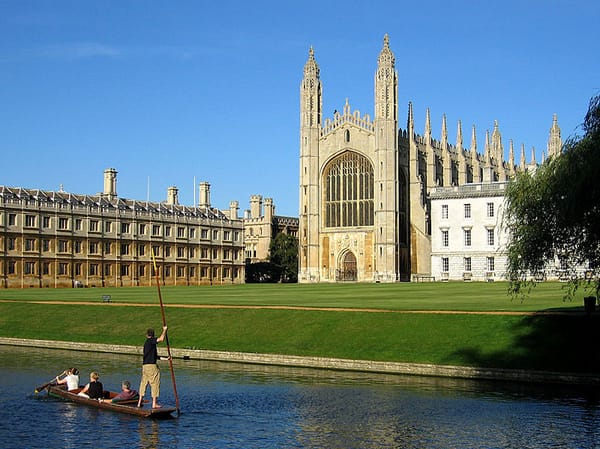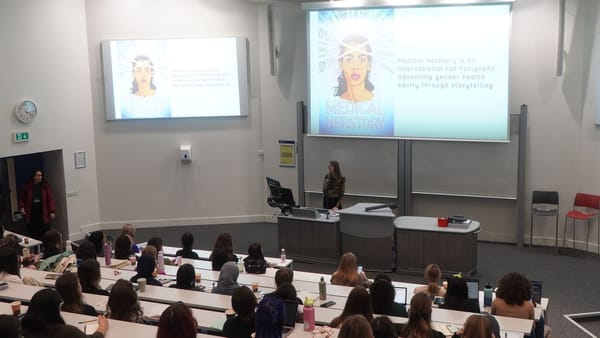Interview with President Alex Kendall
He fought the Life Sciences cuts but supports higher fees: Alex Kendall on why he picks his fights carefully

Life Sciences cuts and Student Protests
Would you say that you have been an activist this year? Yes, I have, but not in the general sense. I don’t just jump on any bandwagon because it happens to be something other people are getting excited about. I’d like to think the Union is quite good at picking its fights carefully, if they need to be fought, but also in collaborating on some things and realizing that some issues are better attacked in a different way.
The biggest thing that you’ve been an activist on is the Life Sciences cuts. Would you say that protests that were led by the Union were successful? It depends how you measure it. We were unsuccessful in changing the plans for the restructure, which are now going ahead. However, we were successful in making a lot of people in College, the management side, realize that students do care about their education, and I think, even though they won’t admit it, they know the plans were badly thought through. On the other side, we were able to make those people that are being made redundant, and other members of staff, aware that students do care about them, and care about the teaching they receive.
Does the fact that you are from the Life Sciences department and you did those courses have anything to do with how vigorous the union’s campaign was? It meant that I was more clued up, as to exactly what was happening, and it probably made my reaction better, in a way, because I knew what I was talking about. I’d like to think I’d be able to respond to any department if it was unjust like that, and I think I’ve shown that in the PhD issues.
An area where you have explicitly stepped away from activism is the government’s cuts to higher education. Why did you decide not to engage with the demonstrations? The first thing I heard about this was obviously during the summer when the NUS were planning their demonstration on the 10th November. There were a few reasons why I was a little concerned about that – firstly I wasn’t really sure what its goals were. Obviously it was to highlight student unrest, but the main issue seemed to be the complaint against rising fees, and then tagged onto that was to complain about the government cuts. Obviously those are two related things, but they’re going to make cuts regardless of what we say. They know that students don’t want them to make cuts to higher education – it’s a no brainer.
So the reason not to march on the street is that you don’t think it would change the debate? Yeah, firstly I don’t believe it would have an effect, but that’s not necessarily a reason not to go and demonstrate – people go and demonstrate for a lot of things that they don’t think they’re going to have an effect on. The reason I didn’t put my time into it is because we were elected as a Union to help the students at Imperial. I don’t think that it’s within our remit to spend a long time protesting (some sabbatical officers at some universities literally spend their entire time doing this – organizing protests against cuts). Of course, I wouldn’t discourage students if they wanted to protest; we put the NUS demonstration in the full student email.
Do you see a parallel between the campaign to stop the cuts to the life sciences department and the campaigns to stop the cuts to higher education funding, which also affects Imperial? Well it’s interesting that, a lot of people have said that, and in a way of course you can see a parallel: why would you be lethargic about cuts on one hand and not on the other? It goes back to what I said just now, that actually it is within our remit to try and find a better way to address the changes in Life Sciences. Actually we never said there shouldn’t be a Life Sciences restructure, we just said that if you are going to restructure, and if you really have to get rid of people in that way, and of course it’s horrible, you have to consider every metric, you can’t just look at research, that was the entire point. The other thing is that they are two completely different situations, if you look at it on a UK political level, yes, the country is in a massive deficit, and has a huge amount of debt. But Imperial doesn’t – it could easily keep the Life Sciences department running at a deficit while they reduced it over time. Imperial have enough money to do that. But Britain doesn’t, you could argue.
Some people argue that the government doesn’t need to make cuts on the scale that they are making. That’s a very good point, and I’m perfectly happy to get into a debate with any student about this. However, I don’t think I should be spending my elected time as a sabbatical officer of a student union of one university trying to engage with the government on UK-wide cuts – I don’t think it is what I was elected for. There are a lot of issues going on within Imperial that we can help deal with, and that we have helped deal with.
In terms of how you see your role, why is it right for the Union not to engage in these national issues when many other student Unions do? I think that Imperial students should engage…
…But if the students should engage, why shouldn’t their student union help and encourage them to engage? Helping them to engage is different to actively encouraging them. We did help them to engage, we didn’t ignore the debate by any means, we had the debate in council, we had the debate in Felix, people emailed in, and we are right now having a follow up debate about the bursaries and fees in college, and I’m trying to publish them as much as possible. We’ve certainly helped people get involved. With regards to supporting them to take a particular political viewpoint, no I don’t think that is the Union’s responsibility.
£9,000 Fees
The College has now decided to increase fees to £9,000 subject to conditions, and that’s something you support? Yes. Firstly there is a big gap in the national debate at the moment, which is rightly focusing on the fact that to charge more than £6,000 universities have to show a certain amount of commitment to access. Now obviously I completely agree with that, but the debate hasn’t focused at all on how actually some universities might have to charge £9,000 because their courses cost that much. Courses cost money and the courses at Imperial are especially expensive. By increasing the fees to £9,000, those from lower incomes will have a much greater bursary scheme available to them, and it’s quite exciting how much bigger this will be. Unfortunately there can’t be any announcements until the government specifies its requirements on access.
Is it better to reduce student debt or to offer cash during the course? This is the debate about how the bursaries are going to be targeted. There are two ways. We give students fee waivers, where they don’t have a choice about how to spend that bursary money. You just take it off the debt. Or you give it to them up front in cash. We want to survey the 27% of Imperial students who receive bursaries, to find out how they feel their bursary helps them and also how they think it should be targeted in terms of a fee waiver or cash in hand. Personally, as someone who received a full bursary for my time at Imperial, I found that the difficulty in coming to Imperial was the living costs and for that you need cash in hand. That’s extremely important for widening access.
Do you think that fees of £9,000 exacerbate issues with access? I do accept that there is deterrence in debt, which is the mountain that we all have to climb. One thing that Imperial can start doing straight away is advertising what bursaries are on offer before people apply. I don’t think people have a clue about the bursaries on offer until they arrive here by which point it’s too late to widen access. It does help that the national conversation is about the fact that you need to widen access and improve bursaries if you want to charge £9,000 because then students will know when they see £9,000 that there are good bursaries etc. that’s the mindset we need.
The Union passed a policy last term that backed the Browne Review. It talked about bursaries but it also backed unlimited fees. Is this going to be revisited, tweaked and altered? Yes, in fact we’ll be doing that at the next Council meeting. I wanted to change it in response to the survey we’re hopefully going to do about bursaries, to put in something about higher education funding, where the Union believes bursaries should come from, where they should go and how they should be distributed. And we may need to revisit other parts of it also.
Would you say that there isn’t a good knowledge about what Imperial students think about higher education funding? Yes probably. It’s relatively hard to judge and you can’t keep doing endless surveys. But there’s a point to make that just to cover its costs Imperial has to raise fees. The funding isn’t going to come from anywhere else. There is simply no choice, regardless of my opinion, regardless of any student’s opinion; they have no choice but to raise fees to a certain level. So spending time gathering opinions about “do you think fees should rise above £3,225?” is, I would say, pointless. However, I do think that it’s worthwhile to find out what people think about the difference between £6,000 and £9,000, as in; do you have £6,000 and less financial aid or £9,000 and an impressive packet of financial aid?
Hall Rents
The Union is currently working to make hall rents more transparent. Yes we are, the idea originally came up because I was surprised that first years pay for the fact that we have free Ethos membership from their hall rents. Technically it comes from the whole commercial services budget but if people paid for membership, hall rents would be cheaper. That’s one side of the debate; I’m definitely not suggesting that people should start paying for Ethos. Commercial Services have been very helpful in giving us a breakdown of what makes up the rent, aside from the fundamentals like electricity etc. There were five things: Ethos, the Amenities Fund, Cleaning (which you can argue isn’t a fundamental), the contract length and the cost of wardening – but that’s being addressed by the wardening review and I’m not going to even touch that subject.
Is it right that people pay into an amenities fund that is used to fund social events, when for example that money is used to buy alcohol and they don’t even drink? The amenities fund is for paying for social events. There’s a debate to be had about whether people think the amenities fund should be scrapped entirely and people can pay directly for the events that they attend. But something that I think is a fundamental principle is that no alcohol should be funded from the amenities fund. For a start, we in the union don’t allow clubs and societies to buy food or alcohol from their grant money because they’re consumables; your participation in a club shouldn’t affect on whether you can or can’t have certain consumables and so it shouldn’t affect your participation in a hall either. The fact that some students are subsidising others to drink alcohol is, I think, quite immoral. I’m very interested to hear what students who don’t drink alcohol, because of their religious beliefs, think about this since they’re effectively subsidising other people to do so.
PhD Funding
PhD funding has been a big issue this year. Three departments – Aero, EEE and the Business School – have had problems. Yes it has. I have brought this up with College management. Pro-Rector (Education) Julia Buckingham has been extremely helpful. She’s been very concerned and has investigated and resolved the issues. The problem is that when the College point out there’s something wrong, the department does something; when students do they just shrug their shoulders. It seems to be that they’re hoping that students don’t notice or don’t care.
Do you think they drag their feet on these problems? Yes but the issue in EEE was slightly different. That department was probably the best; they at least arranged a meeting where they explained the situation to students. But with the Aero and Business School issues, they can say that it’s all about miscommunication but I’ve seen the emails and I’ve heard what students affected have said and it just doesn’t match up. So now we’re asking PhD students to monitor their bursaries and how much they are paid and their conditions more vigilantly.
The Union
Metric and FiveSixEight have been well received, but what still needs to be improved? The one thing that we really do need to get right, which is still a problem, is the pricing in metric, which has been a permanent thorn in our side. Some students say that it should be free but you still have to run a business. If you’re going to get bands and artists in, they do charge money and it costs us to run the place. On the other side, if you charge too much you deter students even if there’s a drink offer. It’s extremely hard to judge but we’re sensitive to student concerns about pricing and we have been changing prices, using different models. I will say that it’s never, except for big events like the Winter Ball, going to be more than £5 online beforehand. I think that’s pretty reasonable for a club on Friday until 2am.
One thing that was criticised was serving shark burgers, which is a sensitive issue. Was that the right thing to do? I’m not going to say whether it was right or not, commercial services decided to do these different types of meat and they decided that shark would be one of them. It appeared and it was certified shark meat, it’s not an endangered species but at the same time I was aware that this area is particularly sensitive so I asked them to take it off. However, with the food people generally seem to like what we’ve got this year; I haven’t heard a great deal of negative feedback. It was about getting more variety and the menu is a lot bigger than it was last year.
Finally, have you enjoyed the job? I have really enjoyed it. It has been demanding trying to get students to engage more and express their opinions. For example, Felix had lots of stuff about the Browne Review, we were putting information out, we had a paper to council, we were the only student union to support it actually and yet no one who wasn’t a council member came to council for the debate. I suspect that this isn’t an indictement of Imperial students, that this is not because of apathy but because actually, a university like Imperial is full of people who do understand the value of their degree; charging more for it isn’t going to have such an effect if they get the bursary scheme right. Overall though, this year hasn’t been all about fee rises; there is plenty about the job to find stressful, but also plenty to find inspiring. You get out what you put in.







